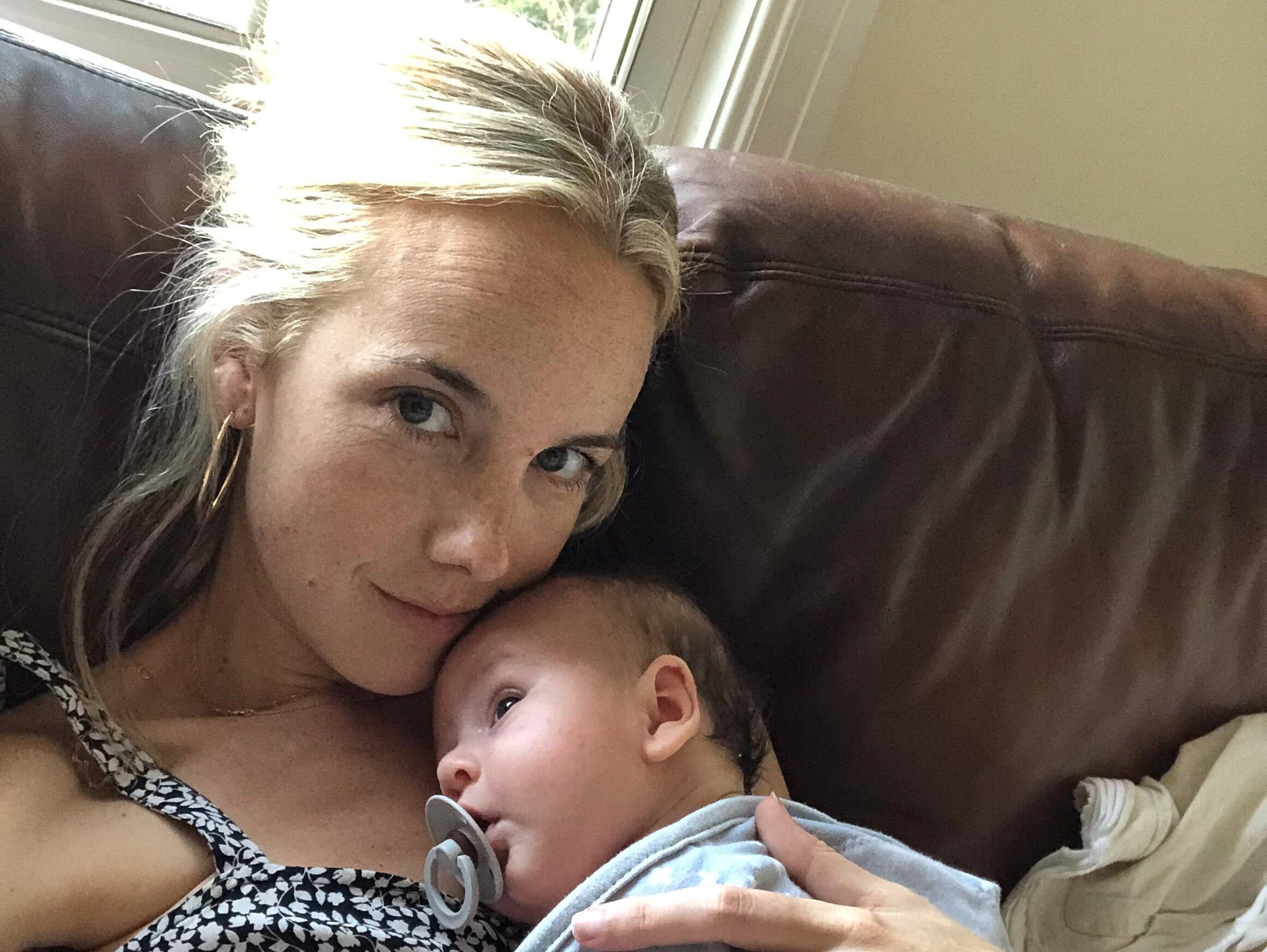The Truth About Pregnancy’s Effects on Running and Body Image

A pregnant female runner in a blue athletic shirt and running shoes is training while pregnant for her next race. She warms up by stretching. This woman enjoys running on trails and at sunset in the evening. Running is her favorite exercise to stay fit and happy. Image taken in Utah, USA.
In June of 2019, at 39 weeks pregnant, I shared a photo of myself post-workout on Instagram, sweaty, baby bump and all. I got a slew of encouraging messages: #pregnancygoals and “You look great!”. I read some of them. But the truth was, I didn’t feel great. An avid runner myself, I had stopped logging miles about five weeks earlier because it simply felt too hard; that day, my workout had consisted of trudging through a 15-minute stairclimber session just to sweat. I responded to one of the messages. It was from an acquaintance in Annapolis who had just had her first daughter. “Gah, so close (even though I know it doesn’t feel like it),” she said. I told her I was doing well; that I was hoping to have the baby early. She responded: “How are you really doing?”
Think about how you reacted the last time someone told you they were pregnant. If it involved congratulatory words, oohs and ahhs, hugs, hearts, and excitement, that’s pretty normal.
“Culturally, most of us are influenced by a typical ‘script’ that is expected in the way we discuss pregnancy,” says Toni Liechty, Ph.D., an associate professor at the University of Illinois at Urbana-Champaign. From an anthropological perspective, it makes sense: It’s easy to view pregnancy as always positive; it helps perpetuate the species.
I used to read this script, too. And then I got pregnant.
My pregnancy wasn’t a surprise. Rather, it was quite planned. After being together for seven years, inching into my 30s, and “knowing” I always wanted to be a mom, it felt only logical to start “trying” with my husband. Just about two and a half weeks later, I was holding a positive pregnancy test and my reaction couldn’t have surprised me more: I called my sister… and I cried. What had I done? I thought.
As the weeks went on, I felt some of that excitement, especially as we told friends and family, but I also felt doubt (can I really be a mom, have a kid, and keep my life?), fear (is this really what I wanted?), and confusion (why am I not more excited?). To be very, very clear: I was happy and grateful—I’d watched friends painstakingly enter infertility battles (as one in 10 women in this country do). In fact, I felt a lot of guilt over my mixed emotions; they were insensitive to people who were struggling to conceive, I thought.

During my pregnancy, my boobs hurt so much I’d cry. I had heartburn every time my baby kicked. Nothing looked less appetizing than spinach being pulverized in a Vitamix (a sight I once craved come lunchtime). And suddenly, my natural stress reliever, running, hurt too. Even though I was looking forward to having a daughter, a big part of me didn’t like being pregnant. But I didn’t dare mutter those words aloud.
The first thing experts who specialize in perinatal mental health, like Katayune Kaeni, Psy.D., a psychologist in Claremont, California, tell people like me is this: You’re not alone. There’s a myth, she explains, that mothers-to-be are supposed to be excited, grateful, glowing, and blessed.
“One set of feelings about pregnancy doesn’t define the whole thing,” Kaeni says. “There is virtually nothing in the world that we have only one feeling about, all the time. That’s not how feelings work.” More often than not? Pregnant women feel a roller coaster of emotions: worry, sadness, anxiety, happiness. That’s common. That’s normal. That’s real.
Yet societal pressure and the expectation to love everything about pregnancy can be intense—and it can backfire. “Sometimes when we feel like we are supposed to be happy and we pretend to be happy when we are not, we end up feeling alone or like something is wrong with us,” says Kaeni. “But there are many, many people who aren’t excited about pregnancy, don’t like the way they feel, or are just waiting for it to be over.”
As I dug into researching this “precious” perinatal period, I found these women. They were huddled in therapists’ offices expressing their fears. They were complaining among themselves about acid reflux so bad it woke them up at night. They were the ones not following “the script”—the ones, like my friend on Instagram, asking: How do you feel?
As a fit woman, it’s a difficult question to answer. Feeling comfortable in your own skin can be hard when you feel robbed of a major vehicle that helps you feel like you. After all, while exercise is safe, healthy, and encouraged during pregnancy, it’s not always easy. Fatigue and nausea can steal your energy; the release of the hormone relaxin leaves you feeling clumsy; front-loading (hi, baby!) changes your gait, putting more pressure on joints and muscles; and increased metabolic, respiration and heart rates mean your body works harder at rest, can’t exert itself as much, and takes longer to recover. And that’s just the short list of changes. While distance runners push their bodies to the limits of human performance, so do pregnant women who meet physical demands similar to those of endurance athletes, according to a recent study published in Science Advances. In short: Pregnancy isn’t just an emotional roller coaster, it’s physically hard, too.
Coming to terms with the mental and physical changes of pregnancy is important, if not crucial. One recent study of 600 pregnant women out of the University of York in the U.K. found that women who felt more positively about their body changes in pregnancy had better relationships with their partners; had lower depression and anxiety scores; and were better at interpreting their bodily signals. That last one is especially important: “Parts of the brain related to body perception communicate with parts of the brain responsible for emotions,” says study author Catherine Preston, Ph.D.
Feeling more positively is not the same thing as following the script; you do not have to love everything that’s happening to your body. In fact, some experts suggest that “body image flexibility”—which refers to a person’s ability to accept negative thoughts about their shape or weight without making efforts to avoid or change them—may be a more realistic and beneficial strategy. (And this goes for any woman, whether your body is changing because of pregnancy, or because of injury, or just because of life.) Simply put: It’s fine to notice the stretch marks, or cellulite, or extra pounds; but making a conscious effort to not dwell on those details (“Oh look, there’s some cellulite… OK, moving on.”) could be better for your mental health and quality of life in the long run.
The last run I went on was at about 34 weeks. It was around an indoor track the day before my sister’s college graduation. She ran by my side and one mile took us 11+ minutes (a pace much slower than I usually clock). I felt heavy, uncomfortable, unmotivated. But I am fortunate in that I was able to work out up until the day before I gave birth. It helped me feel like me. Setting new goals—walking 10,000 steps a day, for example—as well as short hikes, strength circuits, and sometimes even those dreaded stairclimber workouts helped me come to terms with what my body could do during pregnancy. So did speaking honestly about my experience in pregnancy with women who had children as well as with those who didn’t.
If there’s one thing I’ve discovered in the past 10 months, it’s that every single woman’s experience with pregnancy is different. Every. Single. One. Some women truly do love it. They don’t see their feet swell up to the point that their toes balloon. They don’t struggle emotionally. They naturally embrace their growing bellies. Some women have C-sections and fly out of the hospital in three days. Others find everything about the process to be slower, harder. Morning sickness. Natural births. Epidurals. Doulas. Doctors. Depression. They endure, but not without countless seen and unseen challenges laid upon them.
But I’ve also discovered that many women don’t know how to respond to the narrow script that’s too often used to discuss pregnancy. It doesn’t account for individual variation, says Lietchy. Simply put, it’s problematic.
“Many people don’t like pregnancy, but that does not necessarily mean that they won’t like their child or won’t like parenthood. It doesn’t mean that they don’t want the pregnancy either. It’s complex,” said Kaeni. “This is not an either-or situation. It’s a both-and situation.”

My daughter Sunday joined our family just after midnight, the night before the summer solstice. As I write this, fall is settling in and I’m sitting in a coffee shop minutes from my home. Our nanny started today and my daughter, three months old, is sleeping at home. The past few weeks have been laced with surprises, as Kaeni told me they would be, but the best one, perhaps, has been that amidst the stress and sleep deprivation and chaos and newness, I have felt pure joys of motherhood: of looking down at a crib at 6 a.m. and seeing a smiling baby, my smiling baby, looking back at me.
After I close my computer, I’m going to lace up my sneakers for a short run. I won’t make record time or distance. I might not proudly log it to Strava like I once would have. But I’ll do it with a newfound appreciation for my body, and my ability to move and grow. And I’ll keep Kaeni’s words with me every step of the way: “You’re going to feel how you feel. And you won’t know what that is until you’re in it. The more we can allow and accept a full range of emotions for ourselves and others, the easier our journeys will be.”